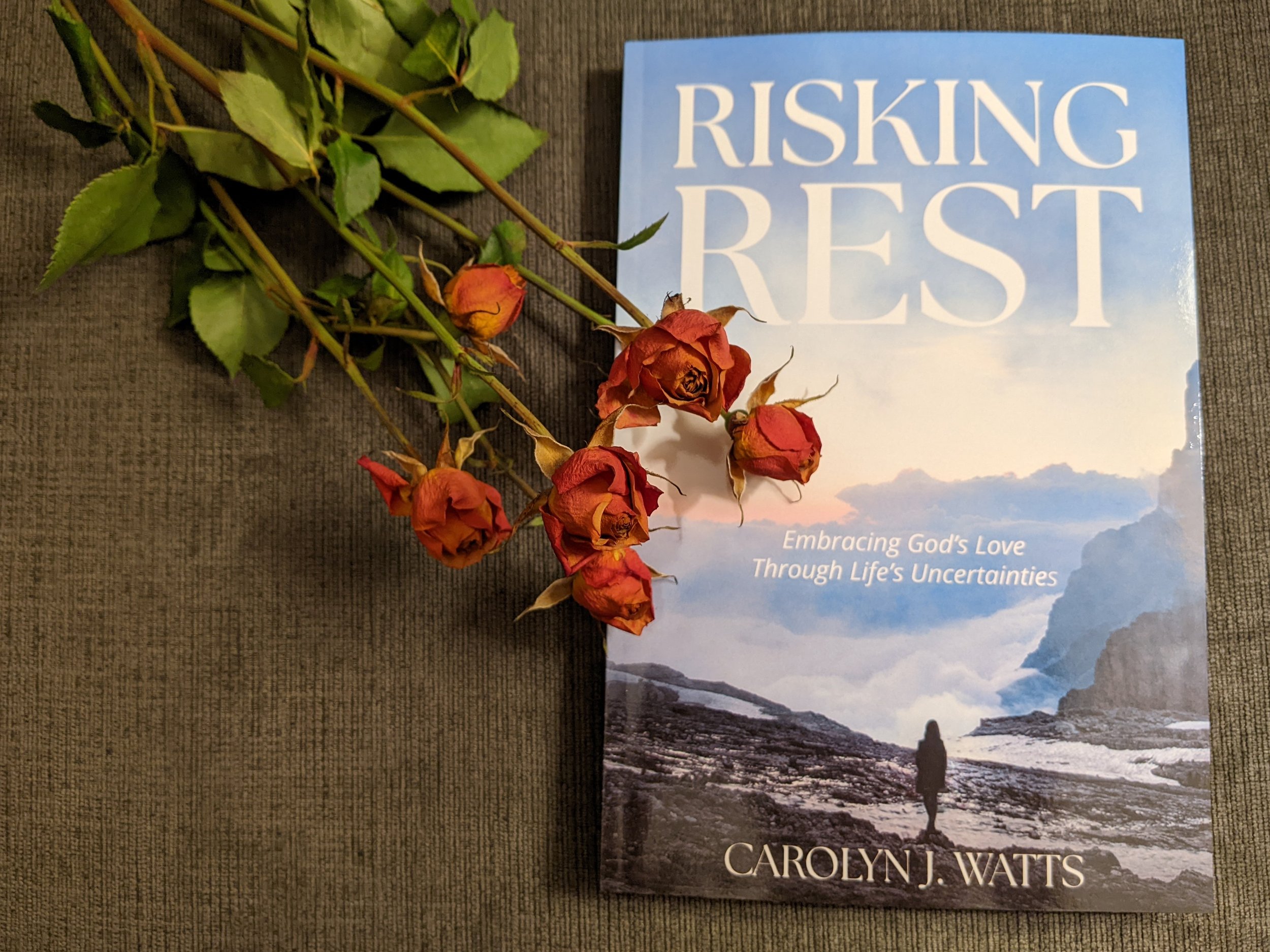Hope for the Times You Feel Empty
Guest Blog Post by - Carloyn Watts
Now that we’re a few weeks into the new year, how are you feeling? Excited and motivated? Empty and flat with the mid-winter blues? Weary? Is the excitement of the new year lingering, or do you just wish winter would hurry up and turn to spring?
Life’s full of ups and downs, isn’t it? Stretches of hard work followed by seasons of weariness. Days of excitement, then of emptiness. Some of us may experience more sadness than joy, or vice versa, but for most of us, life is a complicated alternation of gladness and disappointment, fullness and emptiness.
Once Advent and Christmas have passed, how do we continue to live the startling mystery of the incarnation and of Christ’s ongoing life in us during the ups and downs of the new year? More specifically, how do we live well in seasons of weariness, of emptiness? It’s a question I’ve had lots of opportunity to ask:
When chronic illness returned and I had to trade my work as an obstetrician in Afghanistan for months and years in a bed back in Canada.
When I returned home after a couple of beautiful and difficult weeks with a dear friend who was nearing death, her body eaten away by cancer.
And again recently, after a busy season of sending my first book out into the world and finding myself emptied out by the work and the vulnerability of it all.
How do we live well in these seasons?
There is, of course, an important place for self-care and community and rest and doing what we can to heal and be restored. But also, what can help us welcome life’s ups and downs and encounter Christ within them rather than merely trying to fight or fix them?
As I ask these questions, I find myself coming back again and again to the following words that I wrote a decade ago after my stay with my dying friend, words that made it into the pages of Risking Rest, words that still hold the reminders I need when I feel empty. Whether you’re currently in a season of hope and energy or weariness and emptiness, may these words be a gift for you, too.
“Don’t you believe that Christ is in YOU?”
In the days that followed my stay with my friend, I began to trace the theme of God in us through Scripture. It was hard in those days to feel the truth of what I was reading, hard to believe it.
I was exhausted, empty, listless. I was alone again without strength to write or desire to read. I hadn’t found the energy to unpack or the will to empty the overflowing garbage cans. I had no one to serve.
And yet God kept drawing me back to the idea that Christ was incarnate in me, challenging me to believe it. One day the apostle’s question showed up in a blog post I read: “Don’t you believe that Christ is in you?” (2 Cor. 13:5). Do I?
Do I believe that Christ is in me? That he is in me all the time and not just in those rare moments when I feel strong and able?
When we’re carrying Jesus, there are times we feel full. Joy and belonging, the richness of being known and loved and those privileged glimpses of our own hands being the hands of God as we serve others—these fill and satisfy, making it easy for us to believe that Christ is in us. But when I feel empty? Then I wonder what is wrong. How can I feel empty when I’m carrying within me the One in whom all of God lives? I expect the discomfort of pregnancy to be that of uncomfortable fullness, not painful emptiness. I forget that the One filling me is himself both the fullness of God and the One who emptied himself.
Often it is easier for me to see the love that flows through offered emptiness when it shines in the lives of others than when I’m living it myself. Two years before, my colleague, Louise, continuing to offer her own fullness and emptiness in another part of Afghanistan, had allowed me to include in a blog post her experience of sitting helplessly with a young mother losing her only child.
I sat with her today, and held her hand as she cried, because there was nothing else I could do. The words “Khudawand meraban as” stuck in my throat, not because they aren’t true, but because just at that moment that seemed like a cruel thing to say. “God is kind,” so . . . he will take away your only child? And I had heard those words said over and over, like a mantra, by those around me—the same doctors and mothers of other children who were also telling her not to cry, there was nothing to cry about. The kindness I wanted to tell her about was the kindness of a Father who was crying with her.
Then her husband came in, followed by two other male family members. I watched as this tough Pushtun man quietly cried as he touched his little girl, and I watched as her uncle, only young himself, maybe in his late teens, pulled back her hat and laid his hand on her head, as in a prayer, as tears rolled down his cheeks. And inside I just felt like screaming at the injustice of it—five-month-old girls should not be yellow, should not leak, should not be gasping for breath. Especially not when they came into hospital with a tummy bug that developed into pneumonia and sepsis.
“God is kind.”
It’s one of those things that even God, who formed worlds with words, knew could be heard only through the single wordless Word who curled himself small and helpless and came into the mess of our real, uninsulated lives, surrounded by the pungent scent of fresh dung.
Coming as an infant (the Latin root means “not speaking”), coming, without words of condemnation, into the mess: it’s the way he speaks the truth that it’s not the ideal me that is loved. It’s the real me. It’s the messy, beautiful, fearful me who longs after him, but not nearly enough. The me who loves and struggles and tries to do what only he can do, and then remembers and lets him bring me close again. It’s how he comes right into the places where we feel past knowing what is the truth and wraps us tight in arms that declare, “This is the truth.”
“This is the truth. I am the Truth.” He silently cries it, submitting gladly to the dark crampedness of our inmost spaces. Surrendering to the violent pains of our birthing through his own. Opening those places wide with the bloodied speaking of the speechless Word so we can receive the truth long hidden in the spoken words and know that God is kind. That he is Love.
Five-month-old girls should not leak from old intravenous sites, should not be yellow, should not gasp for breath. No. Nor should the God-man suspended between heaven and earth leak blood-sweat and strain for each breath. But to speak only words into our daily pain would have been futile. So he let himself be spoken, the Word wordless for a while, Creator in created flesh, the Strong powerless, so we could bear his coming near. He gave himself to be cuddled and cared for so he could return our baby embrace with his stronger, truer one, the embrace that had held us from the beginning but from which we, in our fear, had run. This is the truth, arms that lead us through that valley where his death and ours unite in the hope of death swallowed by love.
Want more help resting in God’s love?
If you find yourself weary or empty and longing to draw closer to the One who lives our weakness with us, you may be interested in Risking Rest. You can learn more here or order the book here.
Questions for Reflection:
When have you experienced yourself weary and empty?
How might it help to remember in those times that the One filling you is both the fullness of God and the One who emptied himself
What does it mean to you, especially in your moments of weakness and weariness, that Jesus has experienced our human vulnerability and dependence himself?
A Prayer:
Oh, God, in the moments we feel ourselves weary and empty, hold us especially close. Remind us that feeling weary and empty doesn’t mean we’re failing. It may be a normal part of participating in the life and work of the One who is both the fullness of God and the One who emptied himself, who first took on flesh in Mary’s womb and now lives in us.






